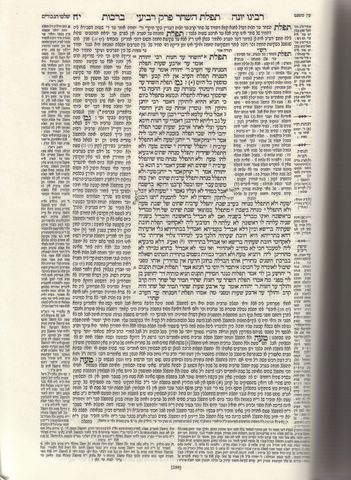
18a
{Brachot 26a}
MISHNAH.
THE MORNING TEFILLAH {Shacharit} [CAN BE SAID] UNTIL MIDDAY {Chatzot};
R. JUDAH SAYS TILL THE FOURTH HOUR.
THE AFTERNOON PRAYER {Mincha} [CAN BE SAID] TILL EVENING {Erev};
R. JUDAH SAYS, UNTIL THE MIDDLE OF THE AFTERNOON. {Plag HaMincha}
THE EVENING PRAYER {Maariv} HAS NO FIXED LIMIT
THE TIME FOR THE ADDITIONAL PRAYERS {Musaf} IS THE WHOLE OF THE DAY;R. JUDAH SAYS, TILL THE SEVENTH HOUR.
{Our gemara has this last line in parentheses, because some versions do not have it. And the Rif does not have this line.}
Gemara:
{The Mishna}: "The morning prayer {Shemoneh Esrei of Shacharit} is until midday {Chatzot}."
And they post a contradiction {with a brayta}:
"Its mitzvah {optimal time} is with the sunrise, such that he juxtaposes geula {the last blessing after Shema} to prayer, and as a result comes out having prayer at day."That brayta was for the vatikin, for Rabbi Yochanan said: Vatikin would finish it {the Shema} with sunrise.
And the whole world {but the vatikin} go according to the words of the Sages - until midday.
And even though we don't hold like the Sages {but rather like Rabbi Yehuda who said until 4 hours}, when one erred and prayed after four hours , the reward for praying they grant him, but the reward for praying in its time they do not grant him.
Rav Yitzchak cited Rabbi Yochanan: If he erred and did not pray Maariv, he should pray Shacharit twice. If he erred and did not pray Shacharit, he should pray Mincha twice.
It was asked, if he erred and did not pray Mincha, may he pray Maariv twice?
Come and hear: For Rav Huna bar Yehuda cited Rav Yitzchak who cited Rabbi Yochanan: if he erred and did not pray Mincha, he should pray Maariv twice, and there is not an issue of the day passing and the korban lapsing. {That is, according to many, prayers were instituted corresponding the various korbanot, and since if he erred and did not say Mincha, it is already the next day, since days start at night, one would think this would be an issue, but it is not.}
And this is specifically where he forgot, but if {he skipped} deliberately, no, and upon him is said (Kohelet 1:15):
| טו מְעֻוָּת, לֹא-יוּכַל לִתְקֹן; וְחֶסְרוֹן, לֹא-יוּכַל לְהִמָּנוֹת. | 15 That which is crooked cannot be made straight; and that which is wanting cannot be numbered. |
The Sages learnt {in a brayta}: If he erred and did not pray Mincha on Erev Shabbat, he should pray Maariv twice, of Shabbat. If he erred and did not pray Mincha on Shabbat, he should pray Maariv twice on Motzaei Shabbat, of the weekday prayer. He should say havdalah {in Ata Chonen} in the first {Shemoneh Esrei} and should not say havdalah in the second. If he did not say havdalah in the first and said havdalah in the second, the second one counts for him {as if it were the first}, and the first one does not count for him.
For he needs to lead off with the obligatory prayer of that time at the head, and since he did not make havdalah in the first one, and he made havdalah in the latter one, it reveals his thought process that the latter one was the one for the obligatory prayer of that time - therefore he needs to return and pray another, in order to have fulfilled his obligatory prayer for that time first.
And if he makes havdalah in both of them - even though he is not required to do this - he is not required to return {and pray an additional prayer.}
And if he also does not make havdalah in either of them, we do not cause him to return, for we learnt {in a brayta}: if he erred and did not mention the power of rain {Mashiv HaRuach UMorid HaGeshem} in the ressurection of the dead {the bracha of Mechaye HaMetim} and prayed for it {later on in Shemoneh Esrei} in the blessing of the year {Mevarech HaShanim}, he is turned back; {if he erred and omitted} havdalah in {the blessing of} Who Grants Knowledge {Chonen HaDaat}, he is not turned back, because he may say it over a cup {of wine}.
It was stated {by Amoraim}:
Rabbi Yossi bar Chanina said: The prayers, the forefathers instituted them.
Rabbi Yehoshua ben Levi said: The prayers were instituted corresponding to the daily sacrifices {temidim}.
They learnt {a brayta} corresponding to the opinion of Rabbi Yehoshua ben Levi: Why did they {the Sages} say the Shacharit prayer is until midday? For the daily sacrifice of the morning could be offered until midday. Rabbi Yehuda says: until 4 hours, for the daily sacrifice of the morning was offered until 4 hours. And why did they {the Sages} say that the Mincha prayer may be said until evening?



No comments:
Post a Comment